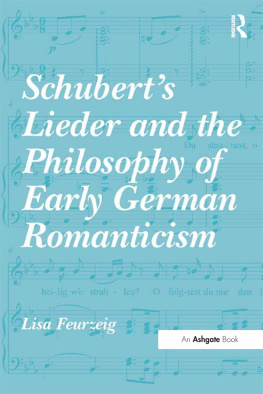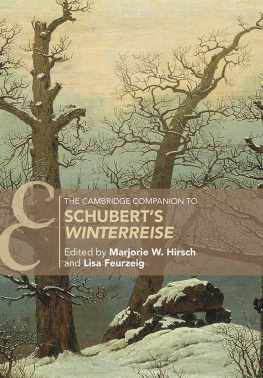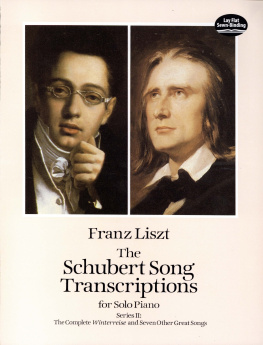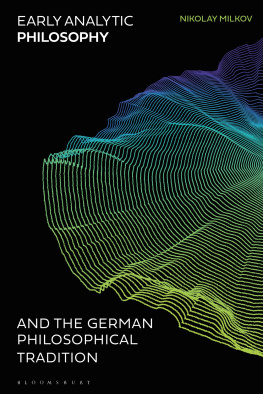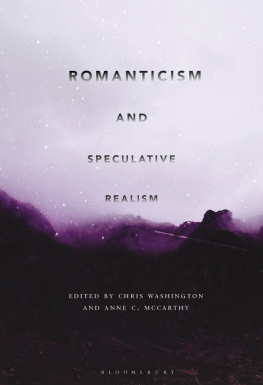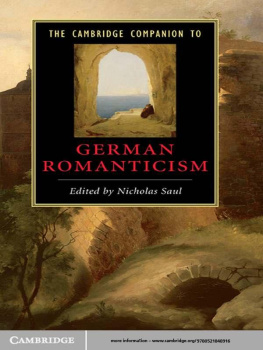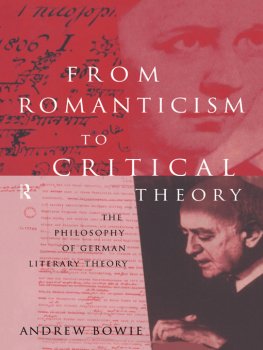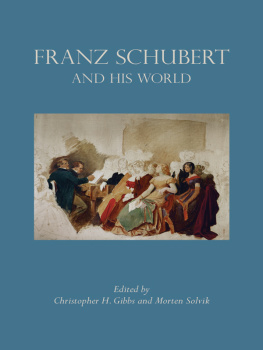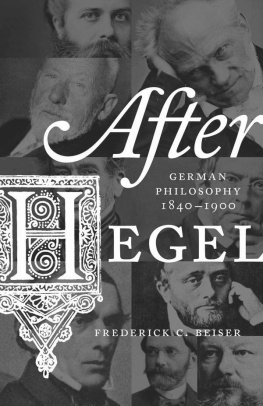Feurzeig - Schuberts Lieder and the Philosophy of Early German Romanticism
Here you can read online Feurzeig - Schuberts Lieder and the Philosophy of Early German Romanticism full text of the book (entire story) in english for free. Download pdf and epub, get meaning, cover and reviews about this ebook. City: London, year: 2016;2014, publisher: Taylor and Francis, genre: Home and family. Description of the work, (preface) as well as reviews are available. Best literature library LitArk.com created for fans of good reading and offers a wide selection of genres:
Romance novel
Science fiction
Adventure
Detective
Science
History
Home and family
Prose
Art
Politics
Computer
Non-fiction
Religion
Business
Children
Humor
Choose a favorite category and find really read worthwhile books. Enjoy immersion in the world of imagination, feel the emotions of the characters or learn something new for yourself, make an fascinating discovery.
- Book:Schuberts Lieder and the Philosophy of Early German Romanticism
- Author:
- Publisher:Taylor and Francis
- Genre:
- Year:2016;2014
- City:London
- Rating:5 / 5
- Favourites:Add to favourites
- Your mark:
- 100
- 1
- 2
- 3
- 4
- 5
Schuberts Lieder and the Philosophy of Early German Romanticism: summary, description and annotation
We offer to read an annotation, description, summary or preface (depends on what the author of the book "Schuberts Lieder and the Philosophy of Early German Romanticism" wrote himself). If you haven't found the necessary information about the book — write in the comments, we will try to find it.
Feurzeig: author's other books
Who wrote Schuberts Lieder and the Philosophy of Early German Romanticism? Find out the surname, the name of the author of the book and a list of all author's works by series.
Schuberts Lieder and the Philosophy of Early German Romanticism — read online for free the complete book (whole text) full work
Below is the text of the book, divided by pages. System saving the place of the last page read, allows you to conveniently read the book "Schuberts Lieder and the Philosophy of Early German Romanticism" online for free, without having to search again every time where you left off. Put a bookmark, and you can go to the page where you finished reading at any time.
Font size:
Interval:
Bookmark:
SCHUBERTS LIEDER AND THE PHILOSOPHY OF EARLY GERMAN ROMANTICISM
Und nur denke, da ich denke
And but think that I am thinking
Friedrich Schlegel, Der Hirt
For John, who is always thinking, and April, who loves mirrors reflecting mirrors.
LISA FEURZEIG
Grand Valley State University, USA

First published 2014 by Ashgate Publishing
Published 2016 by Routledge
2 Park Squre, Milton Park, Abingdon, Oxon OX14 4RN
711 Third Avenue, New York, NY 10017, USA
Routledge is an imprint of the Taylor & Francis Group, an informa business
Copyright Lisa Feurzeig 2014
Lisa Feurzeig has asserted her right under the Copyright, Designs and Patents Act, 1988, to be identified as the author of this work.
All rights reserved. No part of this book may be reprinted or reproduced or utilised in any form or by any electronic, mechanical, or other means, now known or hereafter invented, including photocopying and recording, or in any information storage or retrieval system, without permission in writing from the publishers.
Notice:
Product or corporate names may be trademarks or registered trademarks, and are used only for identification and explanation without intent to infringe.
British Library Cataloguing in Publication Data
A catalogue record for this book is available from the British Library
The Library of Congress has cataloged the printed edition as follows:
Feurzeig, Lisa.
Schuberts lieder and the philosophy of early German romanticism/by Lisa Feurzeig.
pages cm
Includes bibliographical references and index.
ISBN 978-1-4094-4788-7 (hardcover : alk. paper)
1. Schubert, Franz, 1797-1828. Songs.
2. RomanticismGermanyHistory18th century. I. Title.
ML410.S3F39 2013
780.9034dc23
2013019345
ISBN 9781409447887 (hbk)
Eph. | Ephesians |
GH | General Hermeneutics |
GL | Geistliche Lieder |
HC | Hermeneutics and Criticism |
HN | Hymnen an die Nacht |
KFSA | Kritische Friedrich-Schlegel-Ausgabe |
NSA | Neue Schubert-Ausgabe |
Rev. | Revelations |
During the years that have been called his years of crisis, Schubert encountered and set to music many poems stemming from the movement known in German as the Frhromantik: early Romantic circles of writers and thinkers who gathered in Berlin and Jena for a few brief years of intense productive engagement. These young and rebellious intellectuals engendered an exciting hothouse atmosphere from which sprang a rich and tangled jungle of ideas. Flourishing in the 1790s, the intensely social and collaborative world of the Frhromantik faded just after 1800, but its ideas have continued to influence intellectual history ever since. Schuberts involvement, about twenty years after they were written, with poems expressing some of those ideas is but one of many examples.
Since the early Romantics challenged and questioned nearly everything they encountered, it is not surprising that they were concerned with the nature of meaning and understanding. Their interest in the theory of interpretation is reflected, for example, in August Wilhelm Schlegels dialogue Die Gemhlde, which chronicles the discussions several members of the group conducted as they viewed the famous Dresden art galleries. The theologian Friedrich Schleiermacher, closely connected with the early Romantics, was a central hermeneutic theorist of the time. With this circumstance in mind, it is quite interesting and fruitful to examine Schuberts settings of early Romantic poetry through a hermeneutic lens: that is, to explore these songs in order to discover what interpretive strategies Schubert himself used when he approached these texts and used them as a basis for his music.
This study will examine Schuberts settings of two central figures of the Frhromantik: thirteen of his sixteen songs on texts by Friedrich Schlegel and all six of his settings of poetry by Friedrich von Hardenberg, whose poetic pseudonym was Novalis. It will be argued that these nineteen songs demonstrate three interpretive strategies that vary according to important characteristics of the poetry and the thoughts behind it.
Interestingly, the reception histories of these two writers have been quite contrasting. Schlegel has rarely been taken with any seriousness as a poet; his critical and historical essays have been considered his important contributions. It must be admitted that his poetry is characterized by a didactic awkwardness that he never overcame. The very self-consciousness of the poems, though, while it may diminish their effect as sweeping artistic experience, leads them to express their philosophical points quite directly. I will argue that Schubert approached Schlegels poems with their ideas in mind and attempted to find musical equivalents for these. In his most successful settings of these poems, the song can be interpreted as a diagram, or schema, of the poems most essential idea.
Schubert was particularly drawn to Schlegels poems about nature. Eleven of his Schlegel settings were drawn from the poetic cycle Abendrte. Examination of this cycle reveals a coherent and understandable set of ideas that are played out in various ways throughout the twenty-two poems. Although Schuberts settings were composed across a span of about four years, I will consider these songs together. My model of the interpretive strategy used by Schubert in settings from this collectiona strategy for how to convey clear and distinct ideas by using music in various ways to diagram the poems central pointsis first discussed in then addresses the other songs in the Abendrte collection with the ideas of Kant and Schleiermacher in mind. While these songs share certain textual themes and some musical constructions, they also function quite separately, as each is musically determined by specific ideas and images of its text.
Novalis, unlike Schlegel, was first acclaimed as a poet, beginning with publications at the very end of his life and soon after his death. Only in much more recent times has the range of his writings on other topics, including philosophy and science, been fully recognized and appreciated. His poetry, much more evocative than Schlegels, is correspondingly less explicit about the ideas that underlie it. In his poems, Novalis evokes and relives inner experiences, while Schlegel seems instead to design the experiences he describes so that they will fit the philosophical points he wishes to make.
Novaliss poetry blends religious imagery drawn from Christianity with very strong erotic material. Schuberts six selections from two of Novaliss works, the Geistliche Lieder and Hymnen an die Nacht, can be divided into two contrasting groups. Two of the poems are among the poets most individual and passionate creations, while the other four texts approach religion from a more conventional perspective. Schuberts interpretive strategy, as I argue in , was to treat the six songs as a set. This grouping operates on two levels. First, the songs are linked by certain musical qualities, so that they create a shared sound world. Their shared musical material is more comprehensive than that of the
Next pageFont size:
Interval:
Bookmark:
Similar books «Schuberts Lieder and the Philosophy of Early German Romanticism»
Look at similar books to Schuberts Lieder and the Philosophy of Early German Romanticism. We have selected literature similar in name and meaning in the hope of providing readers with more options to find new, interesting, not yet read works.
Discussion, reviews of the book Schuberts Lieder and the Philosophy of Early German Romanticism and just readers' own opinions. Leave your comments, write what you think about the work, its meaning or the main characters. Specify what exactly you liked and what you didn't like, and why you think so.

